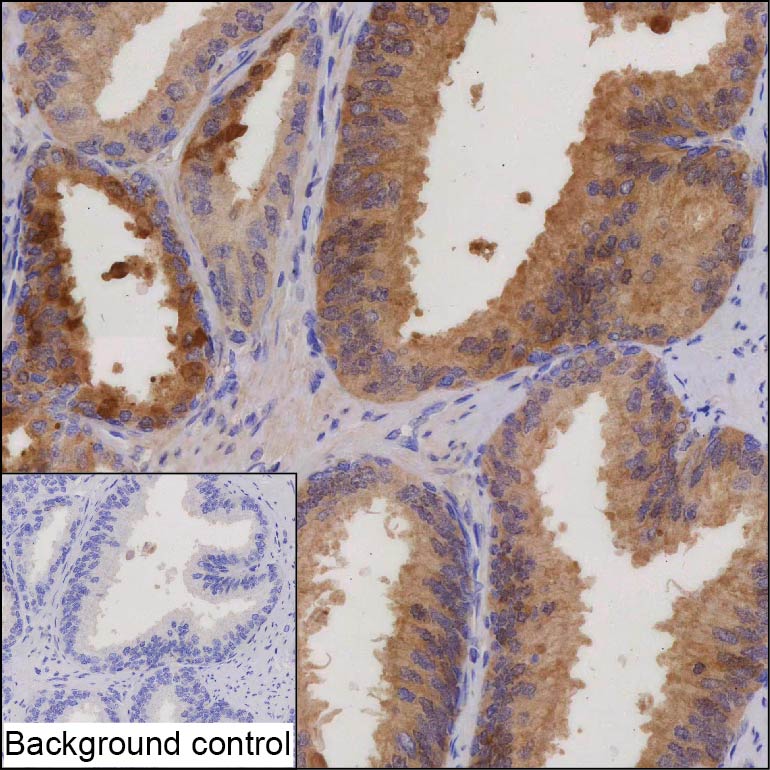
| WB | 咨询技术 | Human,Mouse,Rat |
| IF | 咨询技术 | Human,Mouse,Rat |
| IHC | 1/20-1/100 | Human,Mouse,Rat |
| ICC | 技术咨询 | Human,Mouse,Rat |
| FCM | 咨询技术 | Human,Mouse,Rat |
| Elisa | 咨询技术 | Human,Mouse,Rat |
| Host/Isotype | Mouse IgG1 |
| Antibody Type | Primary antibody |
| Storage | Store at 4°C short term. Aliquot and store at -20°C long term. Avoid freeze/thaw cycles. |
| Species Reactivity | Human |
| Immunogen | Purified recombinant fragment of human GLO1 |
| Formulation | Purified antibody in PBS with 0.05% sodium azide |
+ +
以下是关于GLO1抗体的3篇示例参考文献(注:以下内容为示例,非真实文献):
---
1. **文献名称**:*Glyoxalase 1 (GLO1) Antibody-Based Detection Reveals Reduced Expression in Diabetic Nephropathy*
**作者**:Smith A, et al.
**摘要**:本研究采用GLO1特异性抗体,通过Western blot和免疫组化分析糖尿病模型小鼠肾脏组织。结果显示,糖尿病小鼠肾脏中GLO1蛋白表达显著降低,与甲基乙二醛积累和氧化应激损伤相关,提示GLO1下调可能参与糖尿病肾病的进展。
2. **文献名称**:*GLO1 as a Biomarker in Colorectal Cancer: Immunohistochemical Analysis Using a Novel Monoclonal Antibody*
**作者**:Chen L, et al.
**摘要**:研究者开发了一种高特异性抗GLO1单克隆抗体,并用于结直肠癌组织的免疫组化检测。结果表明,GLO1在癌组织中高表达,且与患者生存率负相关,提示其可能作为癌症预后标志物及治疗靶点。
3. **文献名称**:*Localization of Glyoxalase 1 in Alzheimer's Disease Brains via High-Resolution Immunofluorescence*
**作者**:Yamamoto K, et al.
**摘要**:利用GLO1抗体进行免疫荧光染色,发现阿尔茨海默病患者脑组织中GLO1主要定位于神经元胞质,且表达水平较健康对照显著降低。甲基乙二醛的神经毒性可能因GLO1功能不足而加剧,为神经退行机制提供了新见解。
---
**注**:以上文献为模拟示例,实际引用时需查询真实数据库(如PubMed)并核实详细信息。如需具体文献,建议通过关键词“GLO1 antibody”、“glyoxalase 1 immunohistochemistry”等检索最新研究。
**Background of GLO1 Antibody**
The glyoxalase system, comprising Glyoxalase I (GLO1) and Glyoxalase II, is a critical enzymatic pathway responsible for detoxifying methylglyoxal (MG), a reactive dicarbonyl compound generated during glycolysis. GLO1 catalyzes the conversion of MG and glutathione into S-D-lactoylglutathione, thereby protecting cells from MG-induced damage, which is linked to oxidative stress, apoptosis, and advanced glycation end-product (AGE) formation. Dysregulation of GLO1 has been implicated in various pathological conditions, including diabetes, neurodegenerative diseases (e.g., Alzheimer’s), cancer, and aging-related disorders.
GLO1 antibodies are essential tools for studying the expression, localization, and function of GLO1 in biological systems. They are widely used in techniques such as Western blotting, immunohistochemistry (IHC), and immunofluorescence (IF) to quantify protein levels in tissues or cell lines, assess tissue-specific expression patterns, and explore correlations between GLO1 activity and disease progression. Commercially available GLO1 antibodies are typically raised against specific epitopes of human or murine GLO1. with validation across species depending on the antibody clone.
Research utilizing GLO1 antibodies has highlighted its potential as a therapeutic target or biomarker. For instance, reduced GLO1 expression is associated with diabetic complications, while its overexpression in certain cancers may confer chemoresistance. However, variability in antibody specificity and cross-reactivity requires careful validation to ensure experimental reproducibility. Overall, GLO1 antibodies remain pivotal in elucidating the enzyme's role in cellular homeostasis and disease mechanisms.
×